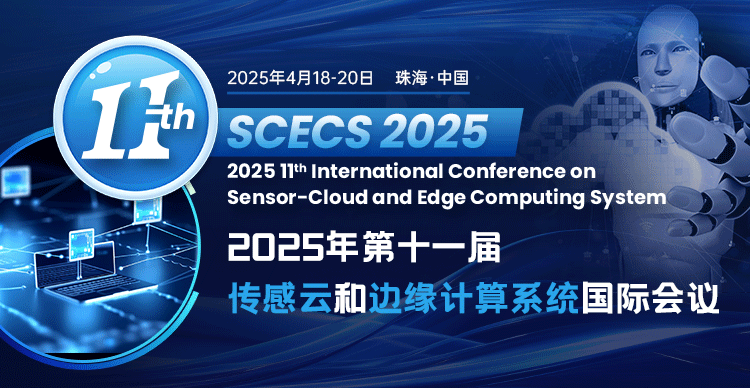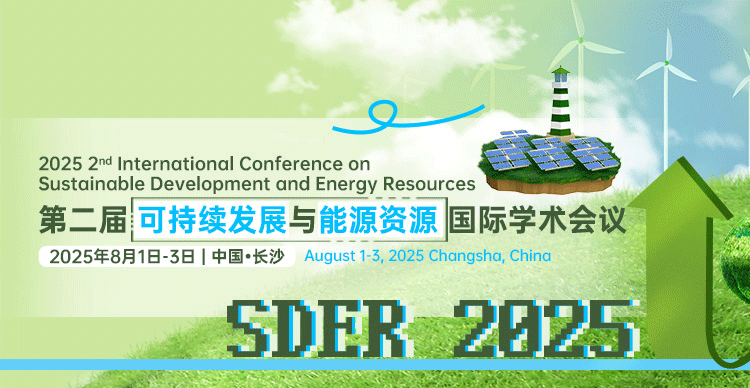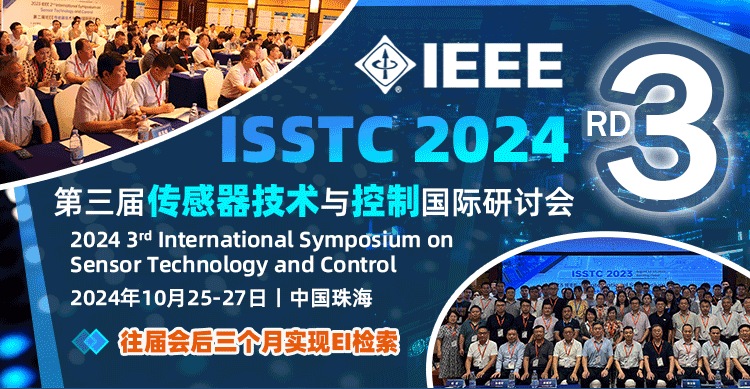第十一届传感云和边缘计算系统国际会议
2025 11th International Conference on Sensor-Cloud and Edge Computing System
会议简介
第十一届传感云和边缘计算系统国际会议 (SCECS 2025)将于2025年4月18-20日在中国珠海召开。
CECS 2025由北京师范大学珠海校区主办,由“大数据云边智能协同”教育部工程研究中心、AEIC学术交流中心共同承办,由北京师范大学-香港浸会大学联合国际学院、暨南大学支持举办。将围绕“传感云”、“边缘计算系统”的最新研究领域,为来自国内外高等院校、科学研究所、企事业单位的专家、教授、学者、工程师等提供一个分享专业经验,扩大专业网络,面对面交流新思想以及展示研究成果的国际平台。通过探讨本领域发展所面临的关键性挑战问题和研究方向,以期推动该领域理论、技术在高校和企业的发展和应用,也为参会者建立业务或研究上的联系以及寻找未来事业上的全球合作伙伴。
会议架构
主会主办单位:北京师范大学珠海校区
承办单位:“大数据云边智能协同”教育部工程研究中心、AEIC学术交流中心
协办单位:北京师范大学-香港浸会大学联合国际学院、暨南大学
会议主席团
指导委员会主席
曹建农教授
香港理工大学
IEEE Fellow
贾维嘉教授
北京师范大学
IEEE Fellow
大会主席
王田教授
北京师范大学
国家级青年拔尖人才
张彦教授
挪威奥斯陆大学
IEEE Fellow
IET Fellow
程序委员会主席
桂冠教授
南京邮电大学
IEEE Fellow
杨光华教授
暨南大学
IET Fellow
IEEE SM
组织主席
郭剑雄副教授
北京师范大学
王文华讲师
北京师范大学
出版主席
韩光洁教授
河海大学
IEEE Fellow
禹继国教授
齐鲁工业大学
IEEE Fellow
宣传主席
戴海鹏副教授
南京大学
IEEE SM
唐志清讲师
北京师范大学
主讲嘉宾(持续邀约中)
曹建农教授,香港理工大学
IEEE Fellow
曹建农,教授,欧洲人文和自然科学院院士,国际电机电子工程师学会(IEEE)会士,计算机协会(ACM)杰出会员,中国计算机学会(CCF)杰出会员,现任香港理工大学研究生院院长、潘乐陶慈善基金数据科学教授、电子计算学系分布式与移动计算讲座教授、人工智能与物联网研究院主任、互联网和移动计算实验室主任、理大大数据分析中心实验室创始人及副主任。主要研究方向为智能物联网分析, 智能物联网系统平台, 智能物联网跨层。
曹建农教授主持和参与开发超过130个科研项目,并作为项目负责人承担包括中国国家自然科学基金委员会、国家科学技术部、香港研究资助局、创新科技署创新及科技基金、香港学者协会、阿里巴巴、IBM、诺基亚、香港赛马会、香港建造业协会等资助机构的项目
周万雷教授,澳门城市大学
周万雷,教授,担任澳门城市大学副校长、数据科学学院院长,入选“全球前2%顶尖科学家榜单”(World's Top 2% Scientists),周教授专长于网路安全与隐私保护、电脑网路、网络教学等研究方向,近年来主持並完成13项澳大利亚国家研究项目(ARC),成功培养30名博士。周教授在一系列国际期刊和国际会议上发表逾400篇学术论文,论文被引用次数逾6000次,编辑了7本专著,出版了4本专著。
注:主讲嘉宾信息持续更新中
征稿主题
1、传感器网络
- 传感器网络协议设计
- 数据融合算法
- 实时数据处理
- 低功耗传感器技术
- 数据质量评估
- 异构传感器网络
- 传感器节点定位
- 自组织传感器网络
- 传感器网络的数据加密
- 传感器网络中的容错性
- 传感器网络的仿真与建模
- 移动传感器网络
- 数据压缩
- 传感器网络中的机器学习
- 数据传输协议
- 传感器网络中的能源管理
- 故障检测与恢复
- 传感器网络的跨领域应用
- 传感器网络中的事件检测
2、传感云架构
- 架构设计
- 数据管理
- 虚拟化技术
- 安全机制
- 服务质量管理
- 与大数据分析的结合
- 数据共享与访问控制
- 传感云应用开发框架
- 弹性与可扩展性
- 自动化工具
- 实时监控
- 传感云服务的自服务
- 大规模数据处理
- 用户体验设计
- 跨领域数据集成
- 多用户架构
- 迁移与共享机制
- 传感云应用案例研究
- 传感云中的协同处理
3、传感云数据处理
- 实时数据分析
- 历史数据分析
- 大规模传感数据的处理
- 可视化技术
- 挖掘算法
- 机器学习的应用
- 传感数据异常检测方法
- 基于云计算的传感数据分析
- 传感数据的预测建模
- 传感数据的聚类分析
- 复杂事件处理中的传感数据
- 传感数据与用户行为分析
- 实时查询优化
- 多源融合技术
- 传感数据流的分析与处理
- 语义分析
- 安全性分析
- 物联网环境中的传感数据分析
4、边缘计算架构与优化
- 边缘计算框架设计
- 边缘计算资源管理
- 边缘节点虚拟化
- 边缘计算与云计算的协作
- 边缘计算的网络协议
- 边缘设备的故障管理
- 边缘计算中的负载均衡
- 边缘计算服务的动态调度
- 边缘计算中的数据缓存
- 边缘智能与机器学习
- 边缘计算中的边缘AI
- 边缘网络切片
- 边缘计算支持的物联网
- 数据流处理
- 边缘计算环境中的应用开发
- 资源调度算法
- 边缘计算中的网络性能优化
- 边缘计算中的延迟优化
- 带宽管理策略
- 多层缓存设计
- 设备连接优化
- 连接效率分析
- 服务质量框架设计
- 边缘计算架构的标准化
- 智能路由策略
- 时间敏感应用的优化
- 边缘计算的能效管理
5、边缘计算的智能算法
- 边缘计算的智能感知算法
- 边缘计算的深度学习应用
- 边缘计算的自适应学习技术
- 边缘计算的数据挖掘
- 边缘计算的增强学习
- 边缘智能算法的集成方法
- 边缘计算的预测模型
- 边缘计算的自动决策
- 边缘计算的优化算法
- 边缘计算场景的特征提取
- 边缘计算的图像处理技术
- 边缘计算的自然语言处理
- 边缘计算数据的实时分析
- 边缘计算中的异构智能算法
- 边缘计算与分布式学习
- 边缘计算中的传感器融合
- 边缘计算中的图像识别
- 边缘计算中的异常检测
- 边缘计算中的情绪分析
- 边缘计算中的多模态学习
6、安全性与隐私保护
- 边缘计算中的数据安全策略
- 边缘计算环境的信息隐私保护
- 传感数据加密技术
- 边缘计算中的身份验证机制
- 网络攻击对边缘计算的影响
- 边缘计算中的区块链应用
- 传感云的安全性评估
- 边缘计算环境的风险管理
- 物联网设备的安全通信
- 边缘计算中的安全协议设计
- 数据隐私和合规性
- 边缘计算中的隐私保护技术
- 边缘计算中的安全审计
- 人工智能在安全防护中的应用
- 边缘计算环境下的访问控制
- 云与边缘计算的隐私泄露分析
- 边缘计算中的安全监控
- 传感器与边缘设备的信任机制
- 边缘计算中的防御机制设计
- 传感云中的风险评估与管理
注:包括但不限于以上主题!
论文出版
SCECS 2025投稿,都必须经过2-3位组委会专家审稿,经过严格的审稿之后,最终录用的论文共同合并成论文集,计划由IEEE出版,见刊后由出版社提交至IEEE Xplore, EI, Scopus检索。
About SCECS 2025
The 11th International Conference on Sensor-Cloud and Edge Computing System (SCECS 2025) is scheduled to take place on April 18-20 2025 in Zhuhai China. The conference will primarily focus on the fields of sensor-cloud and edge computing system providing an academic platform for experts scholars engineers and professionals from various educational institutions research organizations enterprises and establishments locally and abroad. This platform aims to facilitate the sharing of academic research findings exploration of cutting-edge engineering issues as well as discussions on current opportunities and challenges. Through this concerted effort to promote international cooperation and communication while advancing the industrialization of scientific research results.
We warmly welcome scholars both domestic and international to contribute their expertise and participate in the conference.
Important Dates
Full Paper Submission Date: February 3 2025
Registration Deadline: March 3 2025
Final Paper Submission Date: March 18 2025
Conference Dates: April 18-20 2025
Call For Papers
The 11th International Conference on Sensor-Cloud and Edge Computing System (SCECS2025) will bring together leading researchers engineers and scientists in the domain of interest from around the world.
Topics of interest for submission include but are not limited to:
- Sensor Networks
- ·Sensor Network Protocol Design
- ·Data Fusion Algorithms
- ·Real-time Data Processing
- ·Low-power Sensor Technologies
- ·Data Quality Assessment
- ·Heterogeneous Sensor Networks
- ·Sensor Node Localization
- ·Self-organizing Sensor Networks
- ·Data Encryption
- ·Fault Tolerance in Sensor Networks
- ·Simulation and Modeling of Sensor Networks
- ·Mobile Sensor Networks
- ·Data Compression
- ·Machine Learning in Sensor Networks
- ·Data Transfer Protocols
- ·Data Privacy in Sensor Networks
- ·Energy Management in Sensor Networks
- ·Fault Detection and Recovery in Sensor Networks
- ·Cross-domain Applications of Sensor Networks
- ·Event Detection in Sensor Networks
- Sensor cloud architecture
- ·Sensor Cloud Architecture Design
- ·Data Management in Sensor Cloud
- ·Virtualization Techniques
- ·Security Mechanisms in Sensor Cloud
- ·Quality Management of Sensor Cloud Services
- ·Integration of Sensor Cloud and Big Data Analytics
- ·Data Sharing and Access Control
- ·Development fr
- ·Elasticity and Scalability in Sensor Cloud
- ·Automation Tools in Sensor Cloud
- ·Real-time Monitoring in Sensor Cloud
- ·Self-service of Sensor Cloud Services
- ·Large-scale Data Processing
- ·User Experience Design
- ·Cross-domain Data Integration in Sensor Cloud
- ·Multi-tenant Architectur
- ·Migration and Sharing Mechanisms
- ·Implementation of Machine Learning in Sensor Cloud
- ·Case Studies of Sensor Cloud Applications
- ·Collaborative Processing in Sensor Cloud
- Data processing of sensor cloud
- ·Real-time Analysis of Sensor Data
- ·Historical Analysis of Sensor Data
- ·Processing Large-scale Sensor Data
- ·Data Visualization Techniques for Sensor Data
- ·Data Mining Algorithms for Sensor Data
- ·Machine Learning Applications in Sensor Data Analysis
- ·Anomaly Detection Methods for Sensor Data
- ·Cloud-ba
- ·Predictive Modeling of Sensor Data
- ·Clustering Analysis of Sensor Data
- ·Sensor Data in Complex Event Processing
- ·Sensor Data and User Behavior Analysis
- ·Multidimensional Analysis of Sensor Data
- ·Real-time Query Optimization of Sensor Data
- ·Multisource Fusion Techniques for Sensor Data
- ·Analysis and Processing of Sensor Data Streams
- ·Semantic Analysis of Sensor Data
- ·Security Analysis of Sensor Data
- ·Sensor Data Analysis in IoT Environments
- ·Case Studies of Typical Sensor Data Applications
- Architecture and optimization of edge computing
- · Edge Computing fr
- · Edge Computing Resource Management
- · Virtualization of Edge Nodes
- · Quality of Service in Edge Computing Services
- · Cooperation between Edge and Cloud Computing
- · Network Protocols for Edge Computing
- · Fault Management in Edge Devices
- · Load Balancing in Edge Computing
- · Dynamic Scheduling of Edge Computing Services
- · Data Caching in Edge Computing
- · Edge Intelligence and Machine Learning
- · Edge AI for Edge Computing
- · Edge Network Slicing
- · IoT Enabled by Edge Computing
- · Data Stream Processing
- · Application Development in Edge Computing Environments
- · Resource Scheduling Algorithms
- · Network Performance Optimization in Edge Computing
- · Latency Optimization in Edge Computing
- · Bandwidth Management Strategies
- Intelligent algorithm of edge computing
- ·Intelligent Perception Algorithms
- ·Deep Learning Applications in Edge Environments
- ·Adaptive Learning Techniques in Edge Computing
- ·Data Mining in Edge Computing
- ·Reinforcement Learning in Edge Computing
- ·Integration Methods for Edge Intelligence Algorithms
- ·Predictive Models for Edge Computing
- ·Automated Decision-making in Edge Computing
- ·Optimization Algorithms in Edge Computing
- ·Feature Extraction in Edge Computing Scenarios
- ·Image Processing Techniques in Edge Computing
- ·Natural Language Processing in Edge Computing
- ·Real-time Data Analysis in Edge Computing
- ·Heterogeneous Intelligent Algorithms in Edge Computing
- ·Edge Computing and Distributed Learning
- ·Sensor Fusion in Edge Computing
- ·Image Recognition in Edge Computing
- ·Anomaly Detection in Edge Computing
- ·Sentiment Analysis in Edge Computing
- ·Multimodal Learning in Edge Computing
- Security and Privacy Protection
- ·Data Security Strategies in Edge Computing
- · Information Privacy Protection in Edge Computing Environments
- · Encryption Techniques for Sensor Data
- · Authentication Mechanisms in Edge Computing
- · Impact of Network Attacks on Edge Computing
- · Blockchain Applications in Edge Computing
- · Security Assessment of Sensor Cloud
- · Risk Management in Edge Computing Environments
- · Secure Communication for IoT Devices
- · Security Protocol Design in Edge Computing
- · Data Privacy and Compliance
- · Privacy-preserving Technologies in Edge Computing
- · Security Auditing in Edge Computing
- · AI Applications in Security Protection
- · Access Control in Edge Computing Environments
- · Privacy Leakage Analysis in Cloud and Edge Computing
- · Security Monitoring in Edge Computing
- · Trust Mechanisms between Sensors and Edge Devices
- · Defense Mechanism Design in Edge Computing
- · Risk Assessment and Management in Sensor Cloud
Publication
All papers will be reviewed by two or three expert reviewers from the conference committees. After a careful reviewing process all accepted papers will be published in the Conference Proceedings and submitted to EI Compendex for indexing.
Note: All submitted articles should report original results experimental or theoretical not previously published or being under consideration for publication elsewhere. Articles submitted to the conference should meet these criteria. We firmly believe that ethical conduct is the most essential virtue of any academics. Hence any act of plagiarism or other misconduct is totally unacceptable and cannot be tolerated.







